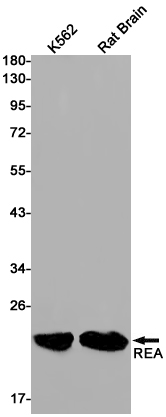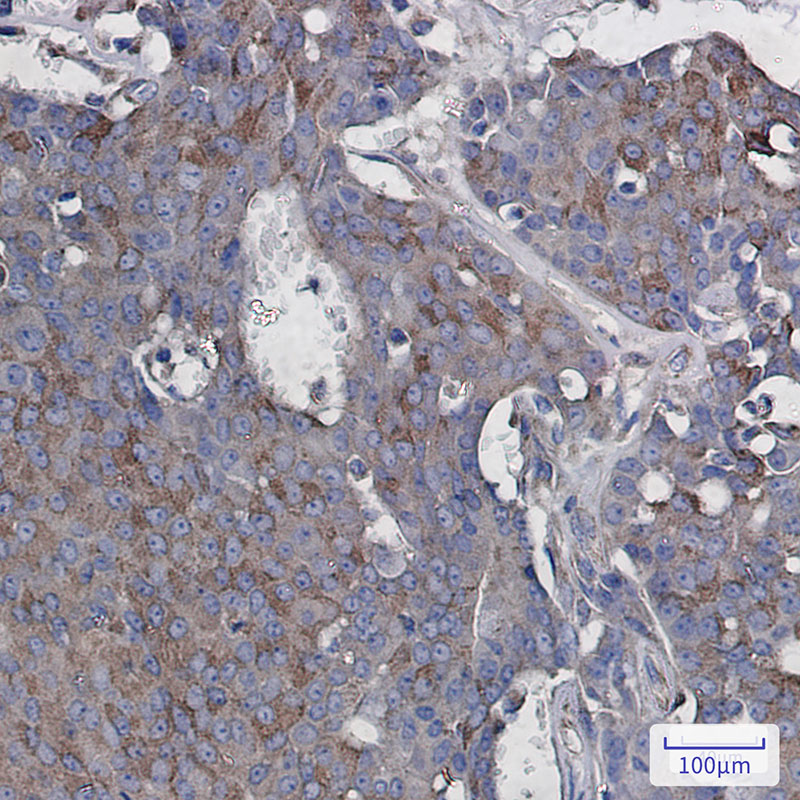

| WB | 1/500-1/1000 | Human,Mouse,Rat |
| IF | 咨询技术 | Human,Mouse,Rat |
| IHC | 1/50-1/100 | Human,Mouse,Rat |
| ICC | 技术咨询 | Human,Mouse,Rat |
| FCM | 咨询技术 | Human,Mouse,Rat |
| Elisa | 咨询技术 | Human,Mouse,Rat |
| Aliases | ras-related C3 botulinum toxin substrate 3 (rho family; small GTP binding protein Rac3) |
| Entrez GeneID | 5881 |
| WB Predicted band size | Calculated MW: 21 kDa; Observed MW: 21 kDa |
| Host/Isotype | Rabbit IgG |
| Antibody Type | Primary antibody |
| Storage | Store at 4°C short term. Aliquot and store at -20°C long term. Avoid freeze/thaw cycles. |
| Species Reactivity | Human,Mouse,Rat |
| Immunogen | A synthetic peptide of human RAC3 |
| Formulation | Purified antibody in TBS with 0.05% sodium azide,0.05%BSA and 50% glycerol. |
+ +
以下是关于Rac3抗体的3篇示例参考文献(内容为示例,建议通过学术数据库核实具体文献):
---
1. **文献名称**: "Rac3 regulates breast cancer invasion and metastasis by controlling adhesion and matrix degradation"
**作者**: Roberts PJ, et al.
**摘要**: 研究利用Rac3特异性抗体,揭示Rac3在乳腺癌细胞黏附和基质降解中的调控作用,表明其高表达与肿瘤侵袭性相关。
2. **文献名称**: "Characterization of Rac3-specific monoclonal antibodies and their role in studying neuronal morphogenesis"
**作者**: Müller S, et al.
**摘要**: 报道了Rac3单克隆抗体的开发,验证其特异性,并应用于神经元形态发生研究,证明Rac3对轴突生长的调控。
3. **文献名称**: "Rac3 GTPase polarizes macrophages and promotes chemotaxis via distinct signaling pathways"
**作者**: Hanna S, et al.
**摘要**: 通过Rac3抗体阻断实验,阐明Rac3在巨噬细胞趋化中的双重信号通路机制,强调其在炎症反应中的关键作用。
---
建议通过PubMed或Google Scholar搜索关键词“Rac3 antibody”或“Rac3 GTPase”获取最新文献。
The Rac3 antibody is a crucial tool in studying the Rac3 protein, a member of the Rho family of small GTPases. Rho GTPases are molecular switches that regulate diverse cellular processes, including cytoskeleton reorganization, cell migration, proliferation, and differentiation. Rac3. specifically, shares high homology with Rac1 and Rac2 but exhibits distinct expression patterns, with prominent roles in the central nervous system and immune cells. It cycles between an active GTP-bound state and an inactive GDP-bound state, interacting with downstream effectors to modulate signaling pathways.
Rac3 dysregulation has been implicated in cancer progression, neurological disorders, and immune dysfunctions. Overexpression or hyperactivation of Rac3 is linked to enhanced tumor invasiveness, metastasis, and therapy resistance in cancers like breast and glioblastoma. In neurodegenerative diseases, aberrant Rac3 signaling may disrupt synaptic plasticity and neuronal survival. These associations make Rac3 a potential therapeutic target, driving demand for specific antibodies to detect its expression, localization, and activity.
Rac3 antibodies are typically monoclonal or polyclonal reagents developed against unique epitopes of the Rac3 protein. They enable techniques such as Western blotting, immunohistochemistry, immunofluorescence, and flow cytometry to quantify Rac3 levels in tissues or cells. Some antibodies distinguish between active (GTP-bound) and total Rac3. providing insights into its dynamic regulation. Validation steps, including knockout controls and cross-reactivity checks with Rac1/Rac2. ensure specificity. As research expands, Rac3 antibodies remain vital for elucidating its pathophysiological roles and evaluating targeted therapies.
×